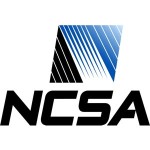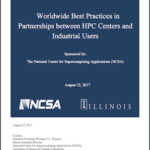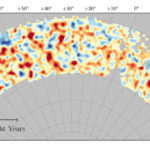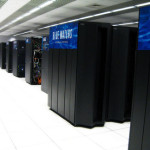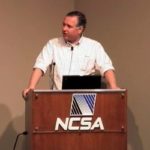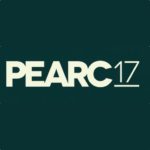Researchers are tapping Argonne and NCSA supercomputers to tackle the unprecedented amounts of data involved with simulating the Big Bang. “Researchers performed cosmological simulations on the ALCF’s Mira supercomputer, and then sent huge quantities of data to UI’s Blue Waters, which is better suited to perform the required data analysis tasks because of its processing power and memory balance.”
NCSA Industry Conference to Showcase Supercomputing Partnerships
Registration is now open for the 2017 NCSA Industry Conference. The event takes place Oct. 11-12 on the University of Illinois at Urbana-Champaign campus. “This year’s conference provides attendees with the opportunity to experience the transformative power of high performance computing and big data as we showcase how the NCSA Industry Program is giving industry and government a competitive edge. Attendees will also get an exclusive look at new resources and collaboration opportunities, the chance to network with business leaders and domain experts, meet the future generation of HPC experts at our student reception, and hear several ground-breaking success stories of how NCSA is enabling computational breakthroughs and changing the world again.
New Study Uncovers Best Practices for Effective Partnerships between Public HPC Centers and Industrial Users
Today NCSA and Hyperion Research released a new study that examines HPC and Industry partnerships. Aimed at identifying and understanding best practices in partnerships between public high performance computing centers and private industry, the study aims to promote the vital transfer of scientific knowledge to industry and the important transfer of industrial experience to the scientific community.
Nuñez-Corrales Awarded SIGHPC Computational Data and Science Fellowship
Santiago Nuñez-Corrales, a graduate researcher at NCSA and Ph.D. student in Informatics at the University of Illinois at Urbana-Champaign was one of twelve recipients to be awarded the SIGHPC/Intel Computational and Data Science Fellowship for 2017. “The fellowship brings with it so many benefits,” said Nuñez-Corrales. “Attending SC17 is important to keep up with development in the HPC community, and the financial support is critical to continuing my degree, as I have no funding from my home country.”
Supercomputing the Dark Energy Survey at NCSA
Researchers are using NCSA supercomputers to explore the mysteries of Dark Matter. “NCSA recognized many years ago the key role that advanced computing and data management would have in astronomy and is thrilled with the results of this collaboration with campus and our partners at Fermilab and the National Optical Astronomy Observatory,” said NCSA Director, Bill Gropp.
NCSA Blue Waters Report Shows Economic Benefits of HPC
The importance of supercomputing on local and national economic prosperity has been highlighted by a recent study which reported that its Blue Waters project to be worth more than $1.08 billion for the Illinois’ economy. The study was completed by the published by the National Center for Supercomputing Applications at the University of Illinois at Urbana-Champaign.
Video: Overview of Scientific Workflows
Scott Callaghan from the Southern California Earthquake Center presented this talk as part of the Blue Waters Webinar Series. “I will present an overview of scientific workflows. I’ll discuss what the community means by “workflows” and what elements make up a workflow. We’ll talk about common problems that users might be facing, such as automation, job management, data staging, resource provisioning, and provenance tracking, and explain how workflow tools can help address these challenges. I’ll present a brief example from my own work with a series of seismic codes showing how using workflow tools can improve scientific applications.”
Video: An Overview of the Blue Waters Supercomputer at NCSA
In this video, Robert Brunner from NCSA presents: Blue Waters System Overview. “Blue Waters is one of the most powerful supercomputers in the world. Scientists and engineers across the country use the computing and data power of Blue Waters to tackle a wide range of challenging problems, from predicting the behavior of complex biological systems to simulating the evolution of the cosmos.”
Exxon Mobil and NCSA Achieve New Levels of Scalability on complex Oil & Gas Reservoir Simulation Models
“This breakthrough has unlocked new potential for ExxonMobil’s geoscientists and engineers to make more informed and timely decisions on the development and management of oil and gas reservoirs,” said Tom Schuessler, president of ExxonMobil Upstream Research Company. “As our industry looks for cost-effective and environmentally responsible ways to find and develop oil and gas fields, we rely on this type of technology to model the complex processes that govern the flow of oil, water and gas in various reservoirs.”
XSEDE Conference Morphs into PEARC17
The Extreme Science and Engineering Discovery Environment (XSEDE) annual conference is transforming into an independent entity designed to unite the high-performance computing and advanced digital research community. The new Practice & Experience in Advanced Research Computing conference (PEARC) will welcome all who care about using advanced digital services for research. The PEARC17 Conference will take place in New Orleans, Louisiana, July 9-13, 2017.


